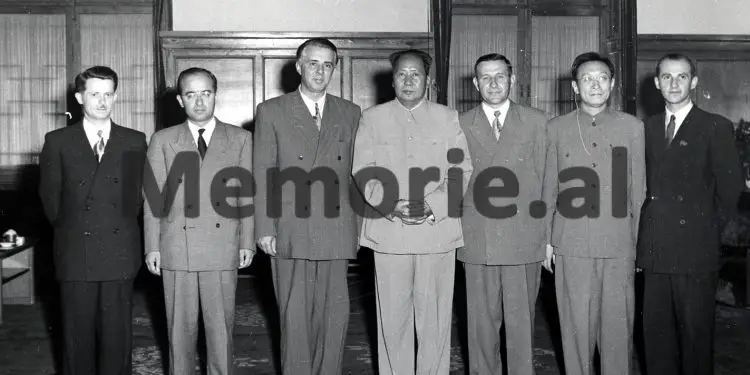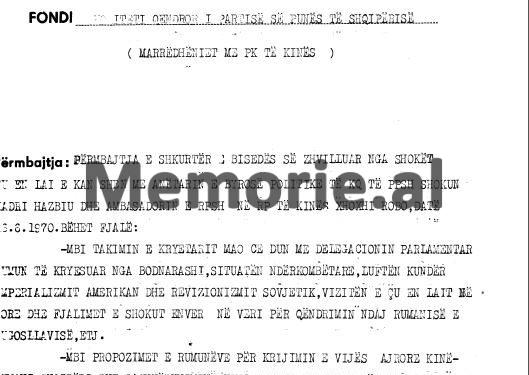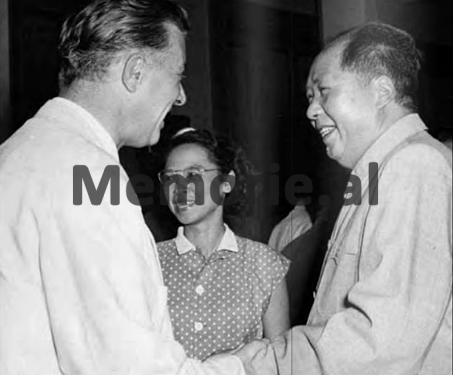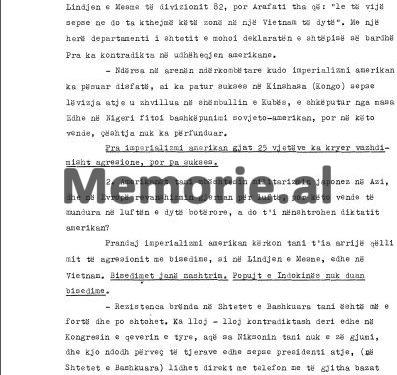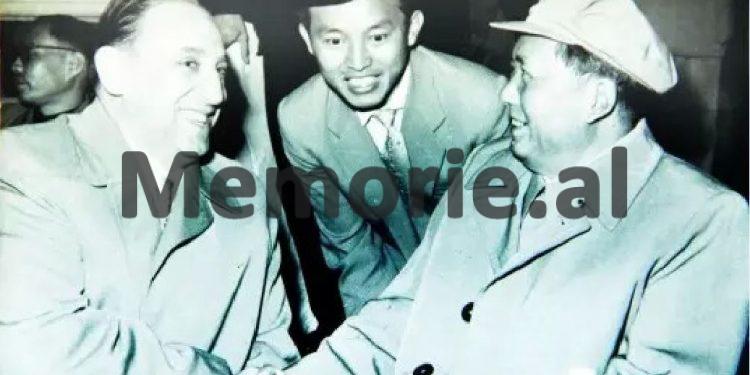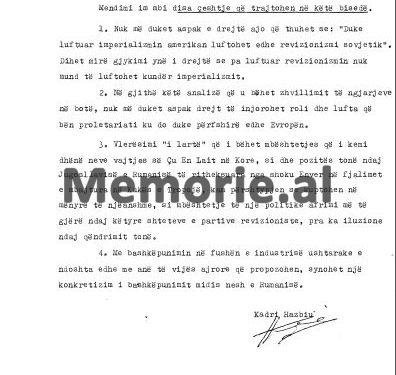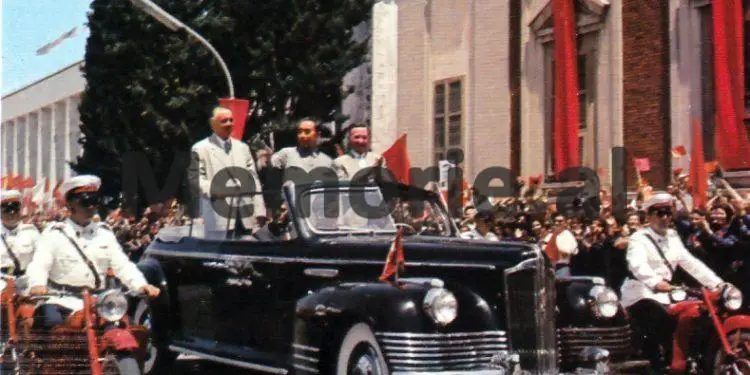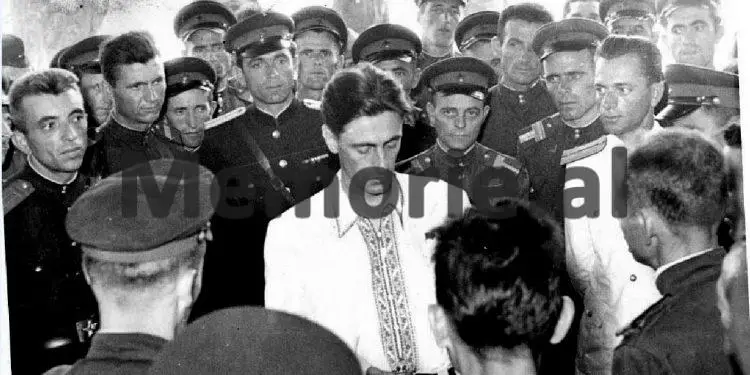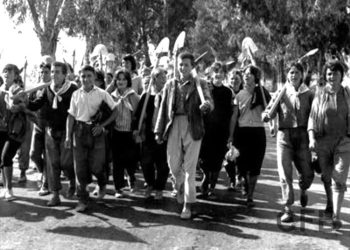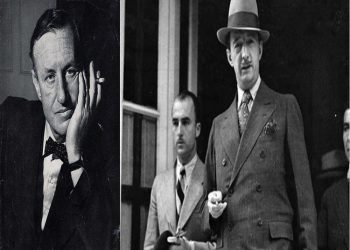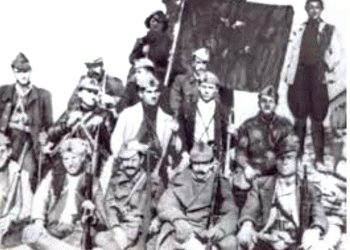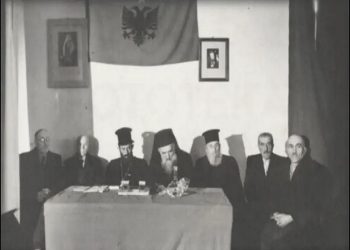Dashnor Kaloçi
Memorie.al publishes an archival document issued by the Central State Archive in Tirana (fund of the former Central Committee of the ALP), dated June 16, 1970, which contains a report-information of the Minister of Internal Affairs , Kadri Hazbiu, sent to the Central Committee of the ALP, regarding the meeting and conversation he had had in Beijing with the Prime Minister of the People’s Republic of China, Zhou Enlai, which was also attended by Kang Sheng, as well as the Albanian Ambassador Xhoxhi Robo. The full report of the then Minister of Internal Affairs, for the conversation with the Chinese Prime Minister, who after informing them about the meeting he had in those days in Beijing with a Romanian delegation led by Bodnaras, they focused on some of the most important issues of international politics, where in the foreground was the US, as well as China’s ties and relations with Vietnam, Cambodia, Korea, the Soviet Union, etc. The messages and suggestions of the Chinese Prime Minister for Enver Hoxha, his speech in the districts of Northern Albania, as well as suggestions for official Tirana, that it should support the Chinese idea of establishing a mutual air connection between China and Romania, with the itinerary China – Afghanistan, or Iran, or Turkey – Romania – Albania, as well as the cooperation of the Albanian government with the Romanians, for the production of anti-tank and anti-aircraft weapons, etc.
The secret report of the Minister of Internal Affairs, Kadri Hazbiu, to the Central Committee of the ALP, regarding the meeting with the Chinese Prime Minister, Zhou Enlai, in Beijing, on June 16, 1970
Brief summary of the conversation between comrades Zhou Enlai and Kang Sheng on June 16, 1970 with me (Kadri Hazbiu) and comrade Xhoxhi Robo.
Comrade Zhou Enlai immediately pointed out that they had some information on a number of issues they wanted to communicate to Comrade Enver, Comrade Mehmet and other comrades.
- Following President Mao’s statement on 20 May, we have held meetings with a number of countries, most recently with the Romanian delegation led by Bodnaras.
– “Chairman Mao spoke about two possibilities:
- Or war forces revolution;
- Or, revolution ensures that war is averted
“More specifically, he said, it has not been determined what the main trend is now.”
– During one year (by Congress) there was a greater push against American imperialism. This was the result of the expansion of the war of various countries against it.
– For 25 years, American imperialism has done great damage to China.
– They supported Jiang Jisei with all resources and by all means, however both were expelled from the mainland. This was a great loss for them.
– Then, there was the war in Korea. In fact, they reached the Yalu River. Our volunteers turned them back and beat them again. This is considered the biggest defeat since the creation of the American state.
– With the Geneva conference (for Indochina) still in progress, they extended their reach to Vietnam and Laos and now they also went to Cambodia. Like Kennedy and Johnson, Nixon is even less certain of how he will end the war in Indochina.
– A similar situation exists in the Middle East. Exploiting the fears of Soviet revisionists, American imperialism has extended its reach to Lebanon, Jordan, Syria, and Iraq. The Americans favor a compromise with the Soviets (because of the Middle East) but the Palestinian war has thwarted their plans. The Americans started a provocation in Lebanon, then in Jordan and now again in Lebanon.
Recently, the White House threatened to send the 82nd Division to the Middle East, but Arafat told them, “Let them come; we will turn this whole region into a second Vietnam.” Immediately, the State Department denied the White House statement. In other words, there are contradictions within the American leadership.
– While American imperialism has seen losses everywhere in the international arena, it has achieved success in Kinshasa (Congo) because the movement there grew in line with the Cuban example, which means it was divorced from the masses. In Nigeria, too, Soviet-American cooperation achieved victory, but nothing has been conclusively decided in these countries.
Thus, American imperialism has been continuously engaged in aggression for 25 years, but has not succeeded.
- Americans now support Japanese militarism in Asia and German revanchism in Europe. But will these two countries, which were defeated in World War II, submit to American dictatorship?
This is why American imperialism is now trying to achieve its aggressive goals through talks, such as those in the Middle East and Vietnam. These talks are a hoax. The people of Indochina do not want talks.
– The resistance movement within the United States is stronger now and is getting stronger. There are all sorts of contradictions up to the US Congress and their government, to the point that Nixon is losing sleep these days. All this is happening because, among other things, the president there is directly connected by phone to all military bases.
– In Libya, they took back the largest military base they had, after the Japanese one. In other words, there is an increase in national independence movements everywhere and a weakening of the position of American imperialism. We see the assertion of President Mao’s thesis, that “smaller countries can also defeat a large country…”
– The United States has a large military budget, but also inflation, and trade deficits, which have resulted from the expansion of the war.
– They donate in front of their dolls in order to incite Asians against Asians and Arabs against Arabs, but this is not working for them.
– The fight against imperialism now reaches as far as Washington. Blacks attack police forces and whites (students) fraternize with blacks. President Mao’s statement has been published in the most important American newspapers (complete or disconnected) and these newspapers sell out quickly. In the Senate and in the military they continue to have arguments for war. Low-level officers distribute anti-war leaflets; the soldiers happily go to rest in Hong Kong and refuse to return to their bases, to the point where they are dragged by force. It is so pronounced, in fact, that the English police there say that this kind of demoralization in the US military has never been seen before.
Based on all this, President Mao came to a conclusion: that we must be prepared for ever-greater provocations, and that the main tendency is revolution. In the development of the revolution, there will be zigzags.
“So it’s a matter of fact that the 1970s are different from the 1950s and 1960s,” said Comrade Mao Bodnaras. He reminded him that the Romanians had advised us in 1964 to end the controversy. But we did not finish it. But now you are starting it because of a number of other issues. (Comrade Zhou Enlai added here: In 1964, Bodnsras, Mauer and Ceausescu came here, and Bodnaras and Ceausescu had a massive controversy with Kang Sheng, and each side defended its own positions).
Emphasizing these changes, President Mao said the main struggle was against American imperialism and Soviet revisionism. It also means fighting other revisionists of all kinds, including those… in our country, here in China.
While emphasizing the struggle against American imperialism, we do not neglect the struggle against Soviet revisionism. We depart from the principle that by fighting American imperialism, at the same time, we are waging war against Soviet revisionism because we further isolate it and suffer as much as American imperialism. This ensures a better mobilization of people.
In Jakarta they held a puppet meeting. Some countries under the influence of the Americans and the Soviets did not participate. This worthless meeting created a commission composed of Japan, Malaysia and Indonesia. At first, the Soviets said this meeting was invalid and the South Vietnam Front commented that the Soviet Union did not have full knowledge of this meeting. Today, however, all three members of the commission, including U Thant, are welcome in Moscow to represent the foreign ministries of the respective countries.
Not only Nixon, but Brezhnev is also having difficulties. They played together in this farce and now face opposition everywhere. This is why they are depressed.
– War is proof of the rise of revolutionary power throughout the world. We must show our determination.
- Chairman Mao told Bodnara:
- Do not be afraid of disorder and chaos. He brought the example of fighting during the Cultural Revolution, which upset some of our friends. This is because cases of disorder distinguish our people from their enemies; our ranks have been strengthened.
Only Nixon and Brezhnev fear the disorder.
- Let us not be afraid of insults, because when our enemies insult us, it means that we have hit them exactly where they should (on target).
Zhou Enlai said: You, Albanians, have published many articles on the occasion of the 100th anniversary of Lenin. We have released a. Soviet revisionists and their followers continue to offend us. The Americans say the Chinese have now directed their war against them, but, indeed, we are targeting both sides.
- Let us not be afraid of war (what Lin Biao said at the 9th Congress is elaborated here).
- We are prepared to confront the Americans and the Soviets, as well as their descendants, one by one, or even all of them at once. At most, they may be able to occupy any territory; they can penetrate deep into our country, but they can never divide China into zones of influence. In Yalta there were discussions about the division of China into spheres of influence, but we did not mention this fact because Stalin led the struggle against fascism and that was the most important thing. The war cannot escalate. We are prepared to face any kind of aggression, but we will not attack anyone. Later, once their aggression is countered, we will reach beyond our borders.
Bodnaras said: We were worried when Czechoslovakia was invaded. Then we mobilized 1,200,000 reservists and 800,000 young people; in case we were to be attacked, we would let the aggressors enter our country for a few kilometers and then we would have organized our primary forces along a secondary line and directed our attack from there. Mao appreciated this plan.
- Further, Comrade Zhou Enlai said:
– We read Comrade Enver’s speeches in the north of the country, in which he said that if Romania and Yugoslavia are attacked, you will support their resistance efforts.
– You have supported Sihanouk, the United Front and his government. This government finds its support within the internal forces, which are now led by the Communist Party of Cambodia.
When Sihanouk was in power, the Cambodian Communist Party worked hard on measures to set them up. Nixon should be thanked for intervening in Cambodia to give the Party a chance to emerge as the main force in that conflict, as well as Vietnam and Laos supporting these forces. In Indochina you now have a great war. The Americans sent troops ostensibly to “liquidate bases in Cambodia” but all of Cambodia has now become a major base.
President Mao has said that all Asian countries are bases for soldiers, while China is the largest of all.
– But to convince some parties that are still hesitant, we need more time, as well as evidence.
Last year, on October 1, we hosted Choe Yong-Gon. At that time, we did not make any other invitation, except Albania.
We gave an invitation to the Koreans on September 30th. Kim Il-sung was not in Pyongyang that day, but as soon as he heard the invitation, he returned, gathered his friends, and decided to send Choe Yong-gon. As head of state, he was given the most prominent position. We knew he would ask for something. During the fireworks display, he talked to Comrade Mao and it was decided that I would go to Korea in April of this year. Sihanouk is there now.
What was the reason for this course change? The enemies made this possible.
– Last year in Washington, Nixon and Sato talked about their main interests being in South Korea, Taiwan and Malaysia.
– At first, Soviet revisionists promised to help the Koreans, but they did not deliver; they did not even provide military assistance. They pressured them to capture the USS Pueblo, the plane crash, and they also suspected that the Koreans were involved in the capture of the Japanese plane recently.
In other words, the Americans and the Soviets themselves gave a number of lessons to the Koreans. And now Koreans say China is their friend.
– In achieving these successes, your support has been total and effective. You supported us with the Indochina issue; you acted immediately after we acted. Likewise, you supported my visit to Korea. For all this, we thank you on behalf of our party and government.
Comrade Enver is a great leader, a great Marxist-Leninist who has made an outstanding contribution to the world revolution.
Comrade Kang Sheng said:
We have read all four speeches made by Comrade Enver. They are very good and testify once again to the fact that we share the same thoughts. We express our gratitude for the high praise addressed to Comrade Mao in these speeches. These speeches are a great lesson for our people.
- Finally, Zhou Enlai noted that Romanians also expressed some additional views:
- Establish a reciprocal air link between China and Romania with the route China – Afghanistan, or Iran, or Turkey – Romania – Albania. This route is shorter and passes neither through the Soviet Union nor through American areas. It allows Chinese aviation to connect to international routes, which would also improve the experience of Chinese pilots.
On this issue, he added, we need the opinion and approval of your government, which we will welcome as soon as possible. In this context, he also asked if we have had diplomatic relations with Afghanistan and Iran, and when I explained that we do not, he said that we have good relations with Turkey and can have a positive impact.
Then, addressing Comrade Kang Sheng, he asked: Did the Romanians make any other suggestions? Kang Sheng said they did and briefly describes a second issue.
- They also stressed the need for co-operation in building the military industry, particularly in the production of anti-tank and anti-aircraft weapons. The idea is to get involved in Chinese-Romanian-Albanian cooperation in the production of these types of weapons
When I asked for clarification on this issue, Comrade Zhou Enlai explained: Romania would provide you with these types of weapons (once the necessary industry had been developed) and this would also address the problem of long distance, which complicates our efforts now. However, we will know more details on this issue only after the Romanian Minister of Defense comes here, after the visit to Korea. We will provide you with this information immediately; we just wanted to let you know about it now. He then conveyed the greetings of Comrade Xie Fuzhi, who, he said, had undergone a difficult stomach operation but is now feeling better. He ended the conversation by conveying the best wishes to Comrade Enver, Mehmet, Hysni, Beqir, Ramiz and others.
I thanked him for the information and assured him that I would communicate it accurately to Comrade Enver and other comrades. I also thanked him for the kind words that were said about our party and Comrade Enver. In light of this, I also stressed that Comrade Enver and our party objectively assess the situation and we have expressed our views on these events. As in the past, we will continue to fight together in the future, side by side, against imperialism and revisionism.
Our party will always support the people’s struggle against imperialism and revisionism, knowing how and where to focus our attack at any given moment.
Despite the fact that the current developments in the world are the result of the objective laws of class warfare, our party will support by all means the struggle of the people – by relentlessly exposing both imperialism and revisionism. This is our obligation, the fulfillment of which accelerates the process of revolution.
We support the idea of carefully exploiting the contradictions that have emerged and will continue to emerge among our enemies.
In the end, I stressed the importance of Comrade Mao’s statement and expressed our wishes for him to have a long and healthy life.
My opinion on a number of issues that were discussed in this conversation:
- I do not see as correct what was said: “by fighting American imperialism, at the same time, we are waging war against Soviet revisionism.” Our correct assessment of this issue is well known – without fighting revisionism one cannot properly fight against imperialism.
- Throughout this analysis of developments around the world, I do not see it correct to ignore the role and struggle of the proletariat everywhere, including in Europe.
- The “high praise” directed at our support for Zhou Enlai’s visit to Korea, in addition to our stand on Yugoslavia and Romania, which Comrade Enver repeated in his speeches in Kukës and Tropojë, seems to me to indicate a one-sided understanding of the issue, as support for the policy of closer relations with these countries and revisionist parties. In other words, these seem to be illusions about our position.
- With the cooperation in the field of military industry, and maybe also in the direction of cooperation in aviation, which was proposed here, they mean more concrete steps in our cooperation with Romania./Memorie.al
Kadri Hazbiu
signature




